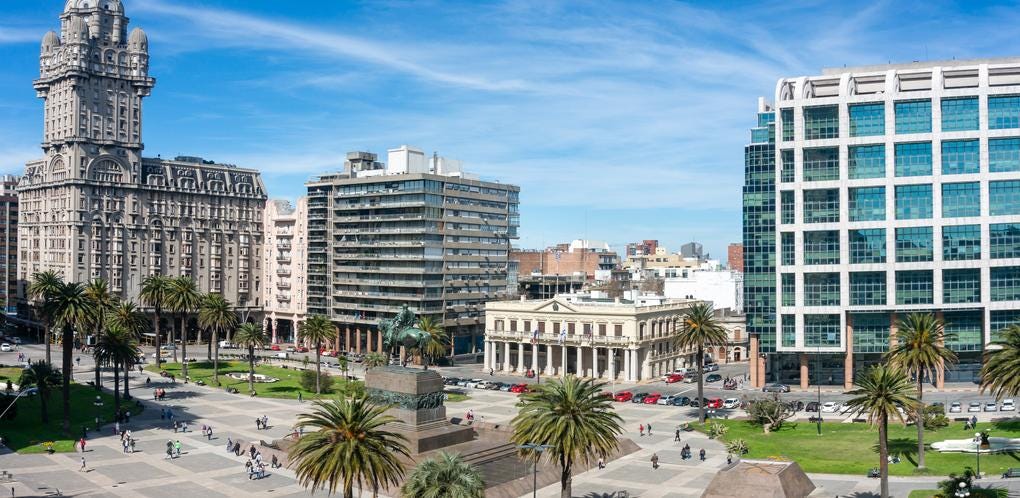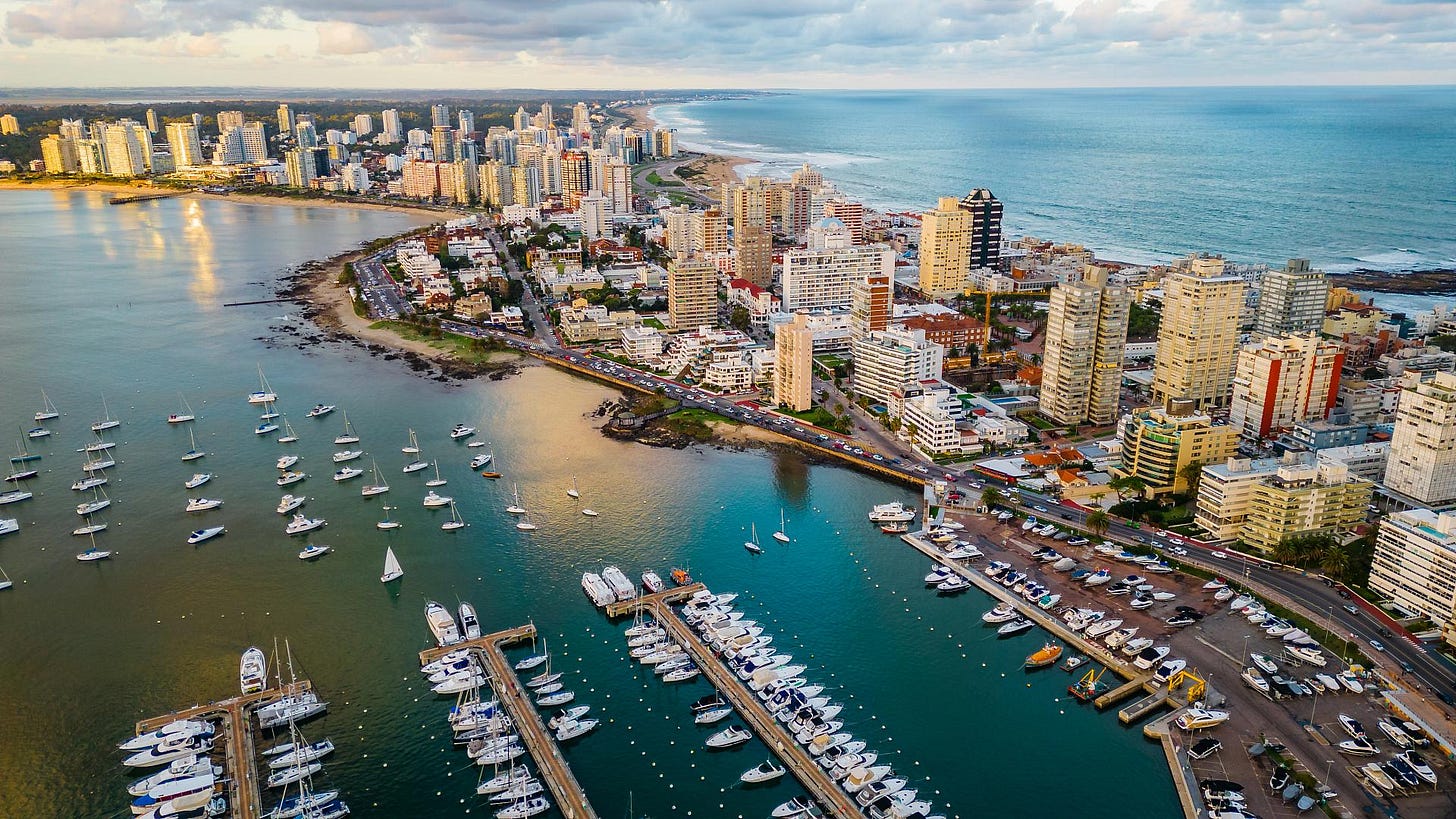Is Uruguay The Ultimate Hidden Location of 2025?
The country with 0% tax for 11 years that nobody talks about
There's a country offering 0% tax on foreign income for 11 years, permanent residency in 24 months, and higher democratic rankings than the United States.
Yet when I mention it to people, many will say the same thing:
"Incredible setup, but..."
That "but" is exactly why Uruguay might be 2025's best hidden opportunity.
I've been calling Uruguay one of the most underrated countries in the world for some time.
The fundamentals are extraordinary:
0% tax on foreign income for 11 years (or 7% lifetime alternative)
Permanent residency in 2 years with $1,500/month passive income
Citizenship in 3-5 years with visa-free access to 153 countries
Ranks higher than the US in democracy, press freedom, and income equality
Home to $9B fintech unicorn dLocal and 350+ companies in tax-free zones
But most people never seriously consider Uruguay for relocation or business.
When I dig into why, I discover something fascinating about how we evaluate countries — and why the obvious choices might not always be the optimal ones.
The Institutional Quality Few Notice
Uruguay has quietly built something remarkable:
Swiss-level governance at developing country entry costs (for the most part).
2024 Global Rankings:
"Full democracy" by The Economist (US classified as "flawed democracy")
8th globally in press freedom (US ranks 45th)
Lower corruption index than the United States
Recent presidential transition praised by CNN as demonstrating "electoral maturity comparable to Europe's most established democracies"
Infrastructure Reality:
First Latin American country with nationwide 5G coverage
98% renewable energy grid (2nd globally after Iceland)
18 years of consecutive economic growth through 2024
Sophisticated tech and financial sector positioning as regional hub
This isn't theoretical good governance. It's measurable institutional strength that protects long-term investments and business operations.
Let’s dig into some more details…
World-Class Tax Architecture
Uruguay's tax system creates opportunities that few jurisdictions can match.
For Individuals: New tax residents choose between two exceptional options:
Complete exemption on foreign income for 11 years
Lifetime 7% flat rate on foreign dividends and interest
The territorial system permanently exempts foreign capital gains, rental income, and pensions — regardless of residency duration.
For Businesses: Uruguay operates 11 Free Trade Zones offering permanent corporate tax exemptions. Companies pay zero national taxes, with only employee social security contributions required.
Zonamerica alone accounts for 1.82% of Uruguay's GDP, housing major international corporations including CITI, Merck, PWC, Tata, and Julius Baer.
Uruguay's Strategic Two-Track System:
Uruguay separates immigration status from tax status, allowing strategic optimization:
Permanent Residency (Legal Immigration): Requires stable income (typically $1,500+/month) and documentation, processed through National Directorate of Migration. Provides legal residence rights and pathway to citizenship in 3-5 years.
Tax Residency (Fiscal Status): Separate qualification for the 11-year exemption, verified annually with tax authority:
Presence method: 183+ days per year in Uruguay
Investment method: $455,000+ real estate + 60 days annually
Economic ties method: Center of vital interests in Uruguay
Strategic Approach: Many optimize by securing permanent residency through income demonstration while separately qualifying for tax residency through investment or presence requirements.
The Citizenship Value
Uruguay's passport provides solid long-term benefits:
Visa-free access to 153 countries including Schengen zone
Recent policy upgrade: all citizens listed as "Uruguayan" regardless of birth origin
US E-2 visa treaty access for business development
Regional opportunities across South America through Mercosur membership
The 3-5 year citizenship timeline compares favorably with established programs, and Uruguay permits dual citizenship without restrictions.
So why isn’t Uruguay more popular?
The Capital City Problem
When people do research on Uruguay, they may find mixed reviews for its capital city, Montevideo — most are negative in some way…
"Most boring city ever... Sorry but it's a terrible, boring and relatively expensive place."
"The least dynamic vibe I've experienced in a capital city."
"Been there many times. It ain't BA or SP."
But these Montevideo-specific critiques might lead people to miss Uruguay's broader strategic value.
Capital cities don't define countries' optimization potential. Luxembourg City isn't why wealthy families establish Luxembourg structures. Delaware's attractions aren't why corporations incorporate there.
That said, let’s take a look at some of the most common complaints for Uruguay…
The Cost Reality For Quiet And “Boring”
Uruguay is South America's most expensive country, running 72.9% higher costs than Brazil.
Price examples:
Restaurant meals: $18 basic, $58 mid-range for two
Rent: $650 one-bedroom city center, $1,100 three-bedroom
Groceries: $6.70/lb cheese, $5.20/lb chicken
International schooling: $9,300 annually per child
"$24 for a can of tuna or $15 for shaving cream is wild," one reader noted about grocery costs.
Overall, Uruguay is cheaper than the most popular hubs but this is definitely a factor to consider when compared to other more affordable options.
It’s worth mentioning that this expense can also create a protective barrier. Countries with low costs attract crowds, driving up prices and reducing benefits over time.
Uruguay's higher costs could filter for more serious residents rather than casual relocators – a positive for the long-term.
Why Institutional Boring Beats Cultural Exciting
Most people evaluate countries on lifestyle factors: restaurants, nightlife, cultural attractions, social scenes.
This misses the fundamental shift in global mobility optimization.
Of course, if you’re a young entrepreneur in their building phase perhaps somewhere like Dubai is more optimal.
But in an era of increasing political volatility, currency instability, and regulatory unpredictability, institutional quality becomes the premium asset.
Uruguay offers something increasingly rare – predictable, stable, democratic governance with measurable quality metrics.
The Strategic Positioning Advantage
Uruguay's regional context enhances its value:
Stability Premium: While regional neighbors face various challenges, Uruguay maintains consistent institutional performance and peaceful political transitions.
Geographic Benefits:
3-hour flight to Buenos Aires for business/cultural access
Strategic position for South American market development
Proximity to major regional financial centers
Access to Mercosur trade bloc advantages
Infrastructure Quality: Unlike infrastructure challenges common in the region, Uruguay maintains reliable public transportation, clean water supplies, stable electrical grids, and modern telecommunications .
Infrastructure Completion:
5G rollout finalized in 2024
Government digitization reducing bureaucratic delays
Free Trade Zone expansions adding capacity
Regional Stability: Uruguay's consistent governance becomes more valuable as global volatility increases.
Who Is Uruguay For
Optimal Candidates:
Passive income earners with substantial foreign revenue streams
Location-independent entrepreneurs and digital businesses
Companies suitable for Free Trade Zone operations
Families prioritizing institutional stability and safety
Investors building regional South American strategies
Poor Strategic Fit:
High-energy entrepreneurs needing dynamic environments
Cost-conscious retirees on fixed budgets
Anyone requiring frequent direct flights to Europe/Asia
The distinction:
Uruguay serves optimization objectives, not necessarily lifestyle preferences.
Although I hear Punta del Este is wonderful (but expensive…).
The 2025 Timing
Several factors make 2025 particularly strategic for Uruguay positioning:
Global Program Restrictions:
Spain terminated Golden Visa program (April 2025)
Portugal eliminated real estate pathway for Golden Visa
EU closed all citizenship by investment routes (Malta)
Caribbean programs raising investment thresholds
Tax Timeline Optimization: New residents in 2025 could benefit from 11-year exemptions through 2036. Given 12-18 month processing timelines, early 2025 applications capture maximum benefit periods.
As traditional programs become more expensive or restrictive, sophisticated advisors will eventually recognize South America's most stable optimization foundation.
The opportunity lies not in Uruguay becoming the next trendy destination, but in its combination of stability, tax efficiency, and efficient path to residency and citizenship.
Uruguay won't appeal to everyone seeking international opportunities – the lifestyle limitations and higher costs are real considerations.
But for specific profiles prioritizing institutional quality, tax optimization, and regional business positioning over lifestyle amenities…
Uruguay might offer 2025's most undervalued strategic foundation.
I'm planning to visit both Montevideo and Punta del Este soon to understand firsthand how these locations relate to Uruguay’s broader strategic value proposition.
I’d love to know…
What’s your take on Uruguay? Have you visited/lived there?
Reply to this email/comment below and let me know your thoughts – I read every message personally and would especially value input from anyone with direct Uruguay experience.
And if you enjoyed reading this post, feel free to click the ❤️ button and restack so more people can discover it on Substack! 🙏









